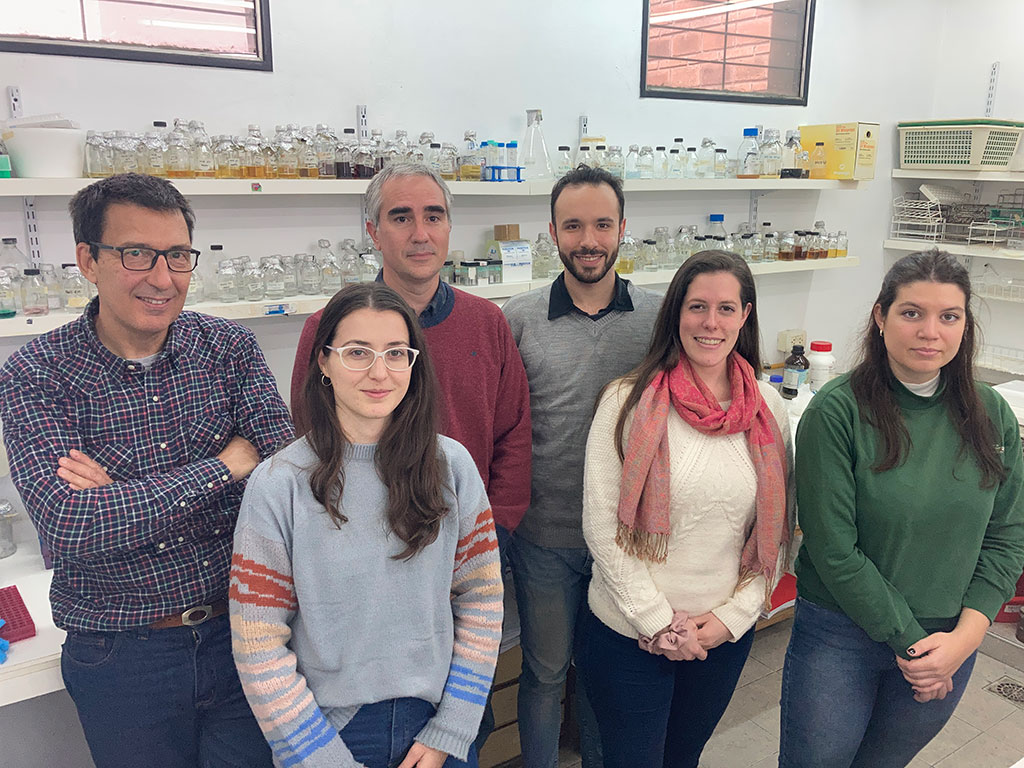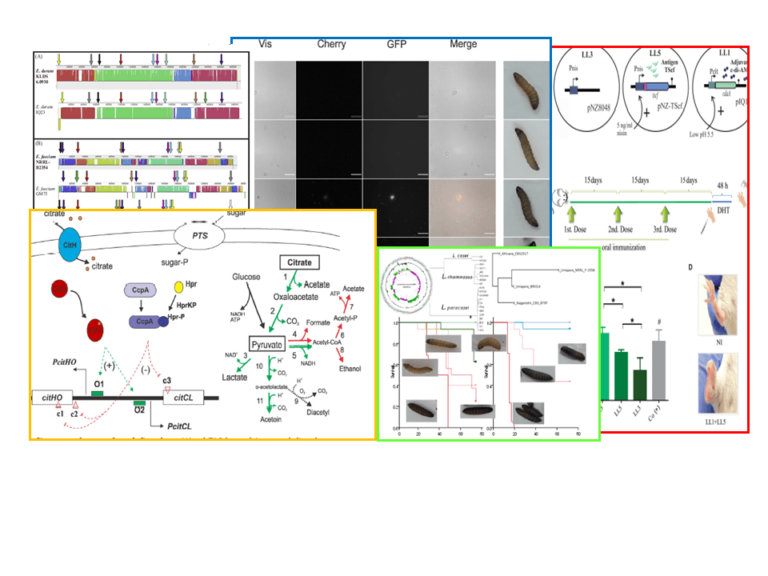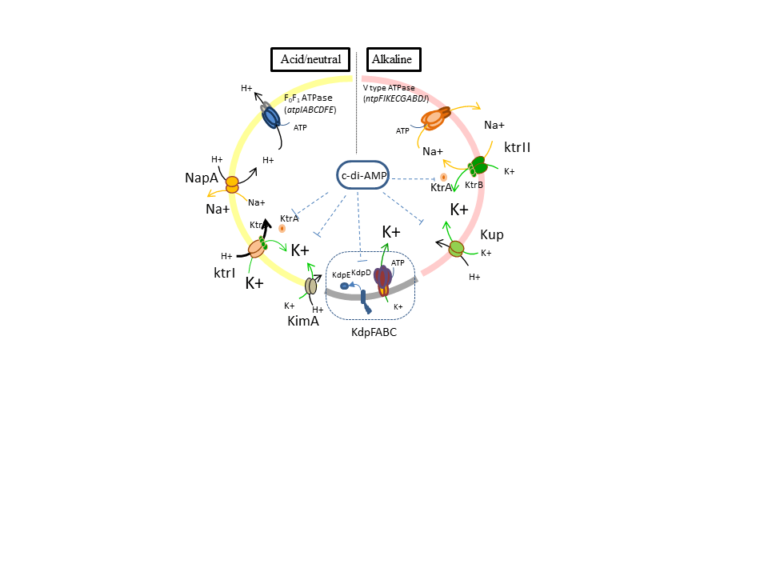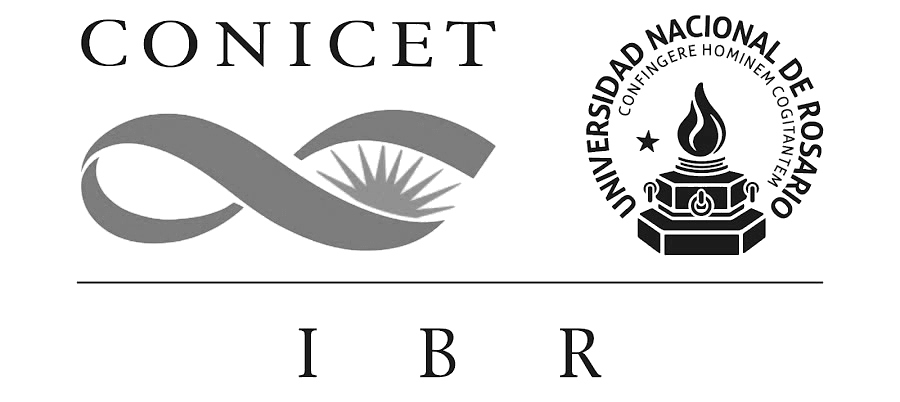research groups
Genetics of Lactic Acid Bacteria
summary

- Magni, Christian Location: Facultad
Email: magni@ibr-conicet.gov.ar
- Blancato, Victor Location: Facultad
Email: blancato@ibr-conicet.gov.ar
RESEARCH LINES
K+ homeostasis in BAL and the role of c-di-AMP
c-di-AMP is a novel second messenger with fundamental biological functions in Gram-positive bacteria physiology and host immunity. This project aims to answer theoretical and applied aspects of c-di-AMP regulation in LAB and its application in the field of food and biopharmaceutical production. Of particular importance will be to describe the mechanisms mediated by c-di-AMP in potassium homeostasis within the diversity of LAB. We will use different complementary approaches including genetic techniques, biochemical characterization, metabolic analysis, microscopy, and gene expression analysis. We have both insect (Galleria Mellonella) and murine models of study. These multidisciplinary approaches will allow us to provide a complementary approach among the participating researchers. Recently, it has been demonstrated that c-di-AMP regulates a variety of cellular processes by binding to proteins and also to RNAm. The levels of c-di-AMP must be carefully adjusted in different environmental conditions to allow optimal growth, in many cases its presence is essential and high levels can be toxic to microorganisms. In addition, this compound is a potent adjuvant with immunomodulatory capacity in mice and is potentially applicable to vaccine development. The intracellular levels of c-di-AMP in bacteria are determined by the synthesis catalyzed by adenylate cyclases and by the degradation of this compound by different phosphodiesterases. This project aims to explore in depth the K+ transport system in Enterococcus faecalis, for this purpose we propose the construction of a system that allows biochemical characterization and interaction studies of c-di-AMP using the Lactococcus lactis model. Principal Investigator: Ch Magni – magni@ibr-conicet.gov.ar
Metaomics and livestock nutrition
The general objective of this line is to contribute to the improvement of silage quality for cattle by evaluating new biotechnological strategies. For this purpose, high-throughput sequencing techniques (metagenomics and metatranscriptomics) are used to study the complexity of the rumen and evaluate the impact of using recombinant lactic acid bacteria (LAB) as a technology to supplement or inoculate silages for cattle nutrition in the region.
Due to the importance of the rumen microbiota in ruminant nutrition and as a source of new enzymes of biotechnological interest, it is of our interest to characterize its composition at the level of microorganisms and enzymes encoded in this ecosystem. LAB are consumed daily by humans and used worldwide for the production and preservation of fermented foods. In this sense, we explore the use of recombinant LAB as safe bacteria to supplement or inoculate silage for livestock nutrition in the region. The impact on microbiological diversity will be analyzed through metatranscriptomics, which also will allow optimizing future LAB designs. Principal Investigator: V. Blancato – blancato@ibr-conicet.gov.ar
Virulence
Certain microorganisms present in food, contribute to the development of the flavor and aroma of food, but may also constitute a health risk for certain individuals. We propose to identify new factors that contribute to the infection or colonization process of Enterococcus, in strains isolated from clinical as well as from food environments. Using a bioinformatics approach, we selected probable virulence factors of microorganisms present in food in order to perform a comparative virulence analysis using the insect Galleria mellonella as a model; and also to study the virulence and regulatory mechanisms involved. Principal Investigator: V. Blancato – blancato@ibr-conicet.gov.ar
Identification of metabolic pathways involved in the final quality of food
One of the mechanisms of resistance to acid stress is decarboxylation reactions. These systems are formed by a membrane transporter that allows the entry of the substrate and a specific decarboxylase. In Lactic acid bacteria (LAB), decarboxylations of organic acids (malate or citrate) and amino acids have been associated with acid stress resistance mechanisms. The citrate fermentation pathway is particularly important in the development of aroma and texture of certain types of cheeses and contributes to the aroma of wines. The main natural flavoring agent, diacetyl, is produced from this fermentation. The general objective of our studies is to delve into the mechanisms of regulation of gene expression in this important group of bacteria. We will delve into the beneficial and detrimental aspects resulting from the decarboxylating activity of certain metabolites in food production. Our working group has experience in studies on the mechanisms of gene expression regulation which remain unknown for this group of bacteria. The knowledge gained will allow us to understand when and why decarboxylations occur and to develop new strategies for the production of high-quality food. Principal Investigator: Ch Magni – magni@ibr-conicet.gov.ar
Images of our research lines


PUBLICATIONS AND PATENTS
Nasal immunization with a L. lactis-derived trans-sialidase antigen plus c-di-AMP protects against acute oral T. cruzi infection.
Nasal immunization with a L. lactis-derived trans-sialidase antigen plus c-di-AMP protects against acute oral T. cruzi infection.
Genomic analysis revealed conserved acid tolerance mechanisms from native micro-organisms in fermented feed.
Genomic analysis revealed conserved acid tolerance mechanisms from native micro-organisms in fermented feed.
The assessment of leading traits in the taxonomy of the Bacillus cereus group.
The assessment of leading traits in the taxonomy of the Bacillus cereus group.
Diversity of volatile organic compound production from leucine and citrate in Enterococcus faecium.
Diversity of volatile organic compound production from leucine and citrate in Enterococcus faecium.
Enterococcus faecalis MalR acts as a repressor of the maltose operons and additionally mediates their catabolite repression via direct interaction with seryl-phosphorylated-HPr.
Enterococcus faecalis MalR acts as a repressor of the maltose operons and additionally mediates their catabolite repression via direct interaction with seryl-phosphorylated-HPr.
Sede CCT Rosario
Ocampo y Esmeralda, Predio CONICET-Rosario
2000 Rosario, Santa Fe, Argentina
Tel. 54-341-4237070 / 4237500 / 4237200
Sede Facultad de Ciencias Bioquímicas y Farmacéuticas
Universidad Nacional de Rosario - Suipacha 531
2000 Rosario, Santa Fe, Argentina
Tel. +54 341 4350596 / 4350661 / 4351235
🔬 El IBR suma 9 proyectos seleccionados en Investigación Orientada 2025 de @ProduccionSF y @CienciaSantaFe.
Biotecnología, salud y sostenibilidad para fortalecer el vínculo entre ciencia, innovación y desarrollo territorial.

